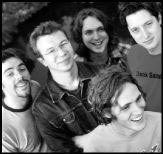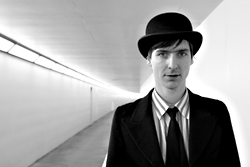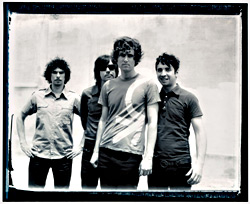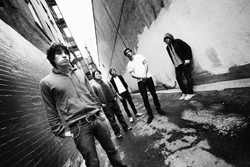GOMEZ
JASON MRAZ
Showbox, 628-3151, $13.50/$15
8 p.m. Mon., Oct. 7
IT’S EARLY MARCH in New York, and a very jet-lagged Ian Ball is looking a little blue, slumped in a swivel chair in an empty conference room at his record label’s midtown Manhattan offices. He and the rest of Gomez have just flown in from England the previous night, so I extend what I hope will be a little morsel of comfort from home: an early recap of the influential English music paper NME‘s review of In Our Gun, the group’s new album.
“What did it say?” he asks with a mixture of excitement and skepticism. “Did they slag it off?” I tell him it was half-and-half. “Oh, good. That’s how it should be.”
If you’ve heard In Our Gun, or any of Gomez’s work, you’ll know what he means. Here’s a band that rediscovered the acoustic guitar at a time when everyone around them was preoccupied with Britpop and drum ‘n’ bass, then decided straight-up folk wasn’t where it was at and so complicated their sound with pretty much anything they could scrounge up: scratchy funk, smooth soul, hardheaded thrash, New Orleans jazz, electronic noodling. The band’s three albums have presented a kaleidoscopic vision of roots music, one virtually guaranteed to agitate listeners looking for a streamlined representation of the form.
Ball demurs when I suggest how unconventional the band’s songwriting and recording process must be, but then outlines one more unusual than I’d expected: After taking a six-month break from the “four-year tour” that followed their first two albums, each of the band’s five members bought his own digital 18-track recorder, and they all moved into a communal house to track In Our Gun. On their own they’d lay down skeletal versions of songs; together they’d link up the machines and see what they had.
“It was a brilliant way of working,” Ball explains, “because you could wake up at 3 in the morning and wander into the fucking kitchen, and there’s all these keyboards attached to strange theremins. You’d think, ‘What the fuck has been going on here?'”
In its mingling of busted synth lines, bucolic strumming, and bubbling percussive grooves, the record warmly reflects that casual experimentation. Think Odelay, for Deadheads.
“I remember being really into Beck when I was 18,” Ball admits. “It was great to hear that somebody had a record collection that was as wildly strange as mine.” He laughs. “Then you realize that there are some tracks he just stole wholeheartedly from Trout Mask Replica. But that’s [OK]—everything’s fair game.”









